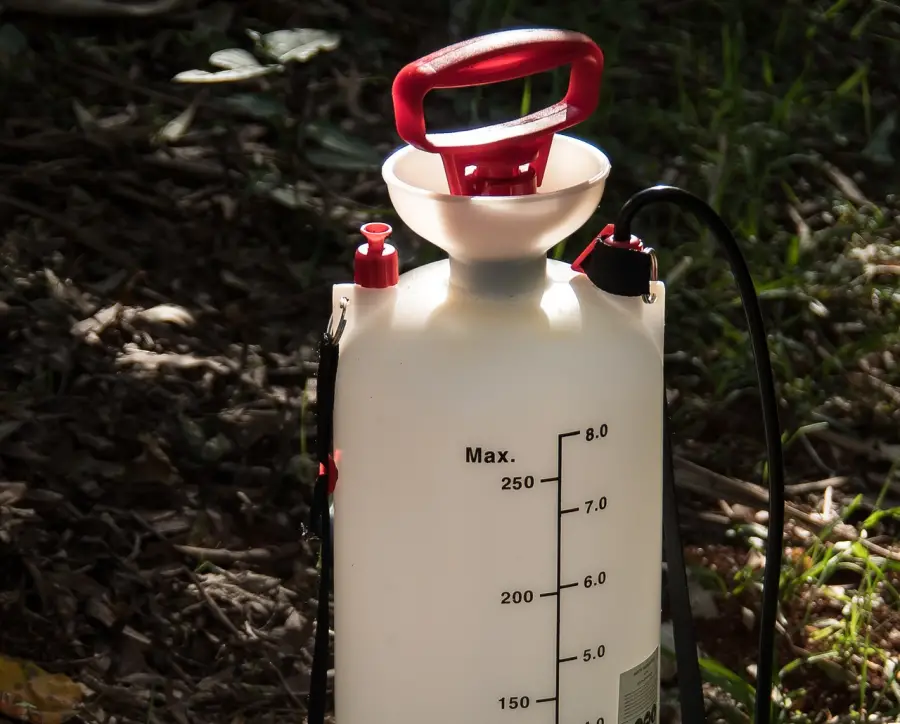Bayer’s Roundup is arguably the most popular herbicide in the world, and it has been for a very long time. Since its introduction in 1976, the glyphosate-based product has been the go-to weed killer for many farmers and landscapers all across the U.S. because of its numerous attributes. But does it have a shelf life or expire?
Concentrated Roundup loses its effectiveness in 7-8 years as long as it is stored in a cool dry place out of direct sunlight. Pre-mixed or factory diluted versions last anywhere from 3 to 5 years with adequate storage. Roundup that is diluted with water lasts a mere 4-5 hours.
Today we discuss one of these key attributes: longevity. Join in as we discuss how long Roundup retains its potency over time. In the same vein, we will then look at how long you can store the chemical before pointing out some useful storage tips.

Contents
Does Roundup Lose Potency?
Since this herbicide is known as the common man’s weed killer, how long can the ‘common man’ estimate he can keep a supply of Roundup without using it? Is there a time limit or shelf life?
Roundup loses its potency after approximately 7-8 years. The storage conditions can play a large role in shortening or lengthening this time frame. If it is diluted with water, the shelf life that can be expected is drastically reduced and may become inert in as little as 4-5 hours.
Most of us know of the effects of Roundup when it is (properly) applied to plants. What is In Roundup though that we need to be concerned about when wondering how long it will stay effective?
To see pricing and specs on one of the most popular Roundup bottles on Amazon, click here.
The Roundup Makeup
The active ingredient, an isopropylamine salt of glyphosate is absolutely deadly to most plants. It is so strong that Monsanto, the company that introduced glyphosate to the world, has developed genetically modified plants that grow into “Roundup Ready” plants.
Plant Growth Inhibitors
Glyphosate works by attacking various plant functions including the growth process. It achieves this by inhibiting the plant from producing certain growth proteins. Glyphosate blocks an enzyme pathway known as the Shikimate pathway, which facilitates the production of growth hormones and amino acids.
More crucially, glyphosate disrupts a plant’s nutrient absorption. When a plant is sprayed with Roundup, the leaves absorb the glyphosate, which works its way through the sap stream to the roots. Once the chemical reaches the roots, it will chelate several nutrients in the surrounding soil to make them inaccessible to the plant.
Glyphosate also blocks the uptake of nutrients like manganese, which in turn affects the plant’s immune system. Once it does this, it then creates an environment that is conducive to the development of harmful bacteria and viruses in the surrounding soil. These pathogens, combined with the plant’s weakened immune system, kill off the plant.
Surfactants
Roundup also contains surface-active agents (or “surfactants”) like polyethoxylated tallow amine (POEA). POEA acts on membrane surfaces and weakens them. In the case of Roundup, POEA works by weakening leaf cuticles, making it easier for glyphosate to infiltrate and wreak havoc.
When Roundup is mixed and applied correctly, you can expect to see results in 12-24 hours. Signs that the product is working include a change in leaf color (green to yellow) and shriveling. If these signs are evident within this timeframe, then Roundup is still high in potency.
If you would like to see more articles like this one, I recommend my others…
- Will Bleach Kill Grass And Weeds In Your Lawn And Walkways?
- A Manual Weed Wacker: Is There A Such Thing?
- Round Trimmer Line Vs Square: Which One Is Better?
How Roundup CAN Lose Its Potency
So, to answer the original question, Roundup does lose its potency.
In its original container, you can expect undiluted Roundup to last up to 7-8 years (from the purchase date) without losing its effectiveness. The container should have an expiration date on it. Of course, this longevity is dependent on the storage conditions.
Self Mixed With Water
It’s a different story when the chemical is diluted though.
Once it has been mixed with water, Roundup can retain its potency for up to 4-5 hours. The product is designed to break down upon exposure to water so, once you dilute it, you should apply it as soon as possible. You should also mix a specific amount of Roundup at a time and leave the rest undiluted.
The type of water used for dilution can influence the speed of this loss in potency. Roundup and its trace chemicals will break down much faster in alkaline water than in acidic water.
Roundup Efficacy Once In The Soil
Once the Roundup is in the soil, it can remain active for any period between 1 and 180 days. The average is about 50 days. In rare cases, soil scientists have detected traces of glyphosate in soil samples 200 days after application!
Roundup’s soil potency while in the soil (or half-life) depends on several factors in and around the soil environment. If the soil doesn’t receive any water, for instance, the chemical will last longer and vice versa. If there is direct sunlight, the product will evaporate faster than in the shade.
Soil microbes and fungi also break down glyphosate. Therefore, the more concentrated these microbes are in the soil, the faster Roundup will lose its potency. Soil particles and glyphosate molecules have opposite charges, which makes them stick together. This then makes it easier for soil microbes to break down the glyphosate and nullify it further.
How To Determine If Roundup Is Still Potent
If you have a particular batch of Roundup that you are uncertain of, or if the expiration date has worn off, you might want to test the product’s potency.
- The first step is to establish a designated test area and a control area. You should also check the weather forecast to make sure there is no rain. Remember, water will wash the product away.
- Next, dilute the Roundup (if concentrated) and apply it to your chosen plants within the test area as per the instructions. Do not spray anything in the control area.
- The next step is to wait 24 hours before returning to observe the results. If there is a visible difference between the sprayed plants in the test area and the unsprayed ones in the control area, your product is still potent. The sprayed plants will be shriveled and discolored while the unsprayed plants will be vibrant and healthy.
Naturally, if there is no difference, there is a good chance that potency has been lost. In such a scenario, you will have to replace the Roundup.
How long can you store Roundup?
As we’ve discussed above, store-bought Roundup concentrate can last for 7-8 years in the right conditions. Roundup must be stored in its undiluted form otherwise it will start losing its effectiveness in less than 24 hours.
The best way to preserve the product is to store it in a cool dry place. It must also be kept out of direct sunlight.
Pre-mixed Roundup formulas may last 3-5 years, provided they are kept at room temperature and out of direct sunlight.
If you have a Roundup container that has been in storage for a very long time, chances are the chemical concentrate would have been sedimented at the bottom with water on top. Before using the product, you must shake the container, or stir the contents, to mix it up properly.
The Final Touches On Roundup’s Shelf Life…
If you have an old container of Roundup and you are not sure if it is past its prime, check the date on the bottle. If it is the concentrated version you should have 7-8 years from the date listed to use it at its full strength.
If the container is a pre-mixed version, then the timeframe is more like 3-5 years.
For the Roundup you or someone else mixed with water, if it is the next day, throw it out. It is time to get a new bottle to tackle those troublesome weeds.
Also check out some of my other articles here…
- Will Bleach Kill Grass And Weeds In Your Lawn And Walkways?
- A Manual Weed Wacker: Is There A Such Thing?
- Round Trimmer Line Vs Square: Which One Is Better?
References
https://www.gardenguides.com/131775-roundup-tree-damage.html
